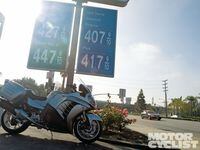This past February, at the local gas station, I started talking with a neighbor who was filling up his truck. Gas prices had just climbed over $3 per gallon, and he speculated that we might never see it under that mark again. I agreed that he was probably right—and this was before political instability in the Middle East really started to get serious.
When fuel prices spiked in the summer of 2008, non-motorcyclists who knew I designed bikes for a living suggested that times must be great for the motorcycle industry. Don’t motorcycles get great mileage? And won’t people flock to the dealerships to save money on gas? I explained that while there would likely be increased sales of scooters and small-displacement motorcycles, most motorcycles do not in fact get great gas mileage. Motorcycling in the U.S. is more of a sport than a practical activity, so as gas prices hurt the economy, motorcycle sales would likewise suffer.
That’s pretty much what happened, and now we’re essentially in the same situation. And again, increasing gas prices are unlikely to result in increased motorcycle sales. Is there anything the motorcycle industry can do to change this?
Toyota has suffered recently with safety recalls and a flood of negative publicity. In an interesting move, the Japanese company announced late last year that it was founding a Collaborative Safety Research Center (CSRC), which would work with universities, hospitals, research institutions, federal agencies and various other groups to improve vehicle and road safety. Toyota has earmarked about $50 million over the next five years for the center, and will work in collaboration with the group, sharing technical information in an open forum.
Skeptics might suggest this is a “cover your ass” move on Toyota’s part, and there’s certainly some truth to that. But the center will probably also make a real contribution to the public’s benefit. As time goes by and people forget about Toyota’s safety recalls, the center will still be in existence. It may be a PR move, but it’s a _smart _PR move!
The motorcycle industry has had chances to show that it is interested in developing fuel-efficient vehicles. Instead, its image has consistently been one of flash, glitz and speed. Don’t get me wrong: I like those things. But isn’t there room for the industry to also show its concern for efficiency, frugality and the common good?
With fuel prices set to soar to new highs, might the motorcycle industry take a page from Toyota’s book and initiate something like a Collaborative Efficient Vehicle Development Center (CEVDEC)? It could be promoted as an industry-wide effort to develop a new range of vehicle technologies to solve transportation problems. In a break with the bad-boy image of motorcycling, this would be a statement that the industry as a whole would be taking on new challenges with a new level of seriousness. Since the issue of fuel prices and availability is a worldwide phenomenon, this could be a worldwide effort, with worldwide PR value.
There are many hurdles to overcome in a project like this, and it would be naïve to say that this would be easy to put together. The Toyota CSRC project is comparatively simple as it’s under the control of one company. One way to initiate the CEVDEC project might be for a single company (say, Honda) to have a basic management role, with other collaborators coming in with information, manpower, facilities and money.
The public goal here would be to advance the development of fuel-efficient vehicles: gas, diesel, hybrid, electric—whatever. But the underlying goal would be to strengthen the motorcycle industry at a time when economic pressures are a real threat.
The industry needn’t give up on racing or performance or even the bad-boy image. But wouldn’t it be interesting if the public image of motorcycling was expanded to include a component of industry-wide creativity and commitment, and if the motorcycle might begin to be seen more seriously as part of the solution to what is becoming a new energy crisis?
Individual motorcycle companies may not have the money or political clout to pursue the kind of policy that Toyota did, but collectively and collaboratively they certainly might be able to change public perceptions and, in time, develop some very useful new technologies. Competition is certainly important, but in difficult times cooperation might be the better strategy.











/cloudfront-us-east-1.images.arcpublishing.com/octane/VZZXJQ6U3FESFPZCBVXKFSUG4A.jpg)
/cloudfront-us-east-1.images.arcpublishing.com/octane/QCZEPHQAMRHZPLHTDJBIJVWL3M.jpg)
/cloudfront-us-east-1.images.arcpublishing.com/octane/HXOUJXQWA5HBHGRO3EMJIGFMVI.jpg)

/cloudfront-us-east-1.images.arcpublishing.com/octane/3TIWWRV4JBBOLDVGRYECVVTA7Y.jpg)
/cloudfront-us-east-1.images.arcpublishing.com/octane/KIX5O23D5NAIBGFXBN3327DKZU.jpg)
/cloudfront-us-east-1.images.arcpublishing.com/octane/7GJYDUIPXRGMTMQKN6ONYOLBOU.jpg)
/cloudfront-us-east-1.images.arcpublishing.com/octane/MUQLOVLL2ZDGFH25ILABNBXKTI.jpg)
/cloudfront-us-east-1.images.arcpublishing.com/octane/TNOU5DNE2BC57MFPMGN2EIDXAM.jpg)
/cloudfront-us-east-1.images.arcpublishing.com/octane/GTCXACQGJ5HAPDTGWUQKDEH44E.jpg)
/cloudfront-us-east-1.images.arcpublishing.com/octane/S35YGSEMEZB4BLTDJTSZPF4GLA.jpg)
/cloudfront-us-east-1.images.arcpublishing.com/octane/5UOT6HPX2JFMRJAX6EH45AR4MQ.jpg)
/cloudfront-us-east-1.images.arcpublishing.com/octane/OKWOJWAKP5EP3OACCRRWPCIX2Q.jpg)
/cloudfront-us-east-1.images.arcpublishing.com/octane/2WF3SCE3NFBQXLDNJM7KMXA45E.jpg)
/cloudfront-us-east-1.images.arcpublishing.com/octane/G4MG6OUCJNBSHIS2MVVOTPX65E.jpg)
/cloudfront-us-east-1.images.arcpublishing.com/octane/IIGGWFOTOJGB7DB6DGBXCCMTDY.jpg)
/cloudfront-us-east-1.images.arcpublishing.com/octane/QSTCM6AVEZA5JJBUXNIQ3DSOF4.jpg)
/cloudfront-us-east-1.images.arcpublishing.com/octane/U4I7G625B5DMLF2DVIJDFZVV6M.jpg)
/cloudfront-us-east-1.images.arcpublishing.com/octane/B6XD6LS6IVCQPIU6HXDJSM3FHY.jpg)
/cloudfront-us-east-1.images.arcpublishing.com/octane/ICL63FEDDRDTTMINYICCEYGMDA.jpg)
/cloudfront-us-east-1.images.arcpublishing.com/octane/FCGZHQXRBZFLBAPC5SDIQLVF4I.jpg)
/cloudfront-us-east-1.images.arcpublishing.com/octane/WNOB6LDOIFFHJKPSVIWDYUGOPM.jpg)

/cloudfront-us-east-1.images.arcpublishing.com/octane/X33NU3E525ECRHXLNUJN2FTRKI.jpg)